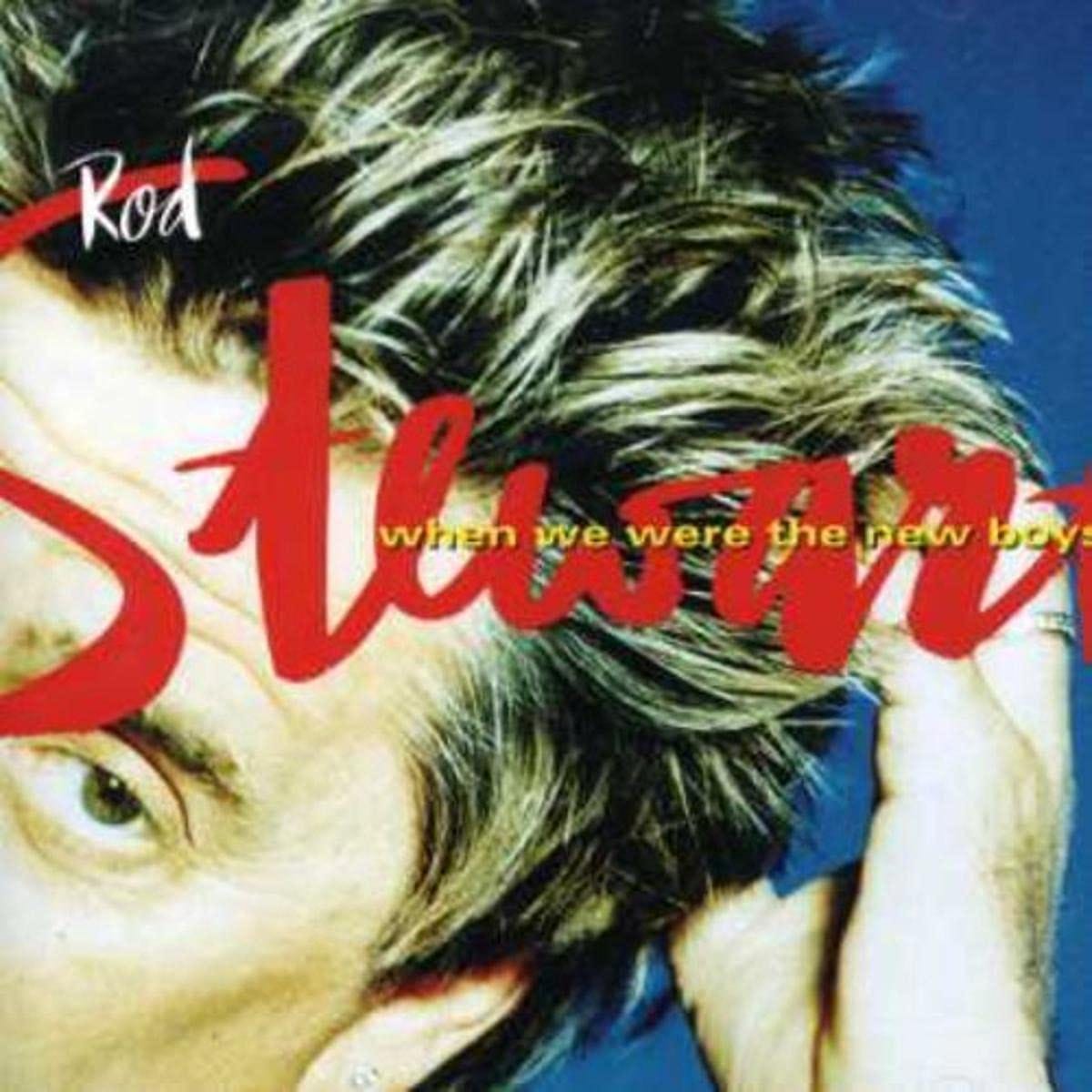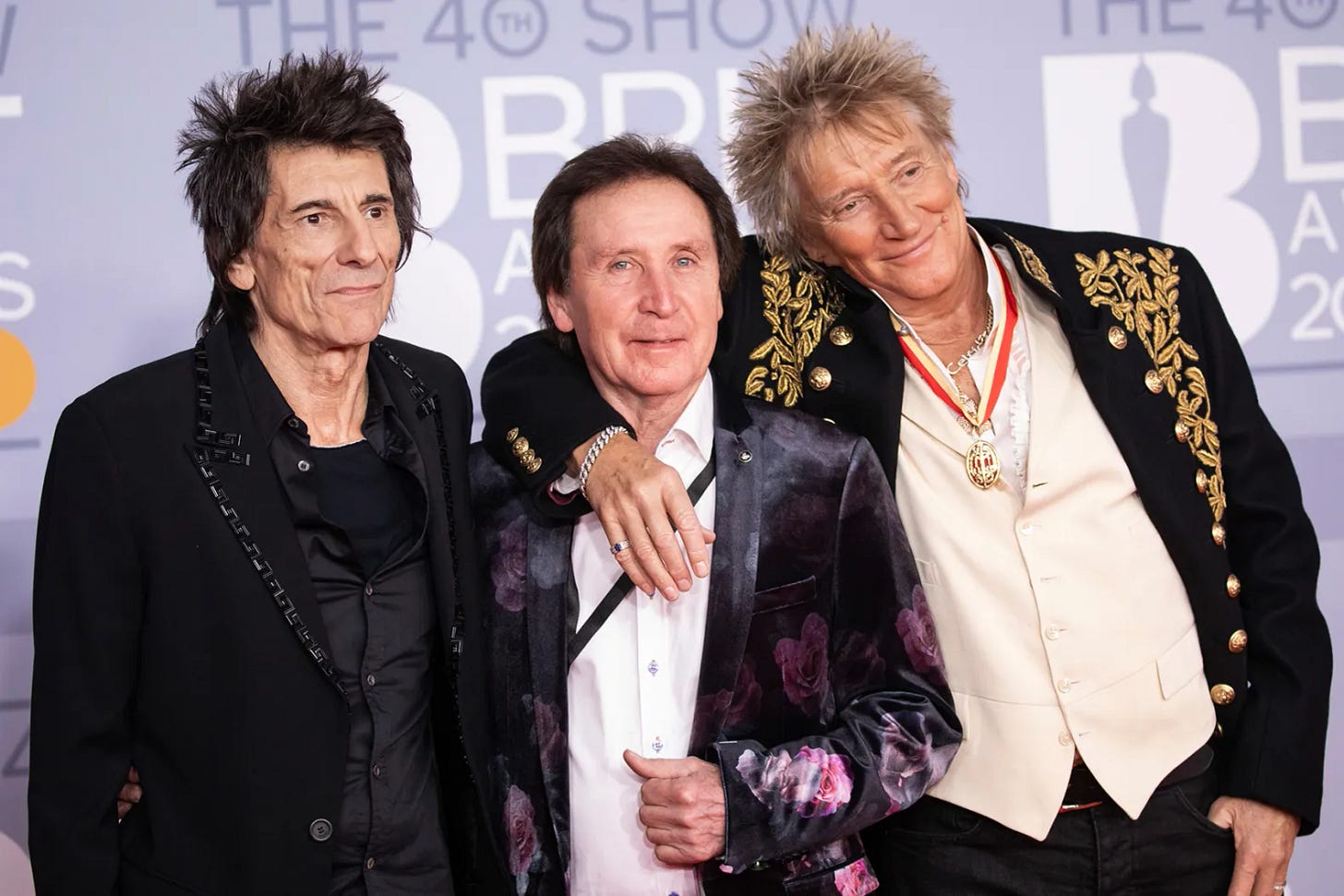Mixtape ReMix: Rod Stewart - 'When We Were the New Boys'
With the Oasis reunion in the news, let's recall when Rod Stewart looked to the Gallagher brothers and a host of other Britpop upstarts to recharge his rock'n'roll spirit. Now let's make it better.
‘Mixtape ReMix’ is a new occasional series where I take an OK album from the past and imagine how it could be better. It’s like fan fiction for hopeless music geeks.
Rod Stewart has spent nearly half a century disappointing the fans who brought him to the dance. Since “Da Ya Think I’m Sexy” - and some argue before that - the audience that marveled at the detailed storytelling of “Every Picture Tells a Story,” “Maggie May,” “Gasoline Alley,” and other early solo tunes, not to mention his work with the Faces and the Jeff Beck Group, has long wondered what happened to their rooster-headed rocker.
There were frustrating flashes of possibilities throughout the 1980s and into the ‘90s. He reunited with Jeff Beck on “Infatuation” and “People Get Ready.” He teamed up with Ron Wood for his turn on MTV’s Unplugged (called in this instance, Unplugged…and Seated). These occurrences were almost like teasing us with a naughty wink, proving that he knew we wanted him to rock out, but he’d soon go back to “Love Touch” and what have you (and this was all before his 21st-century foray into the Great American Songbook).
Adding to the evidence that we missed Rockin’ Rod, as the 1980s turned to the ‘90s, bands like the Georgia Satellites, the Black Crowes, and the London Quireboys wore their Faces’ influence not only on their sleeve but on their entire wardrobe, both as a reaction against the bland glam of the likes of Poison and the desire to recreate the swagger and recklessness of the Borstal Boys. As the ‘90s advanced, Britpop took a few cues from the pub-rock scene of the late ‘60s/early ‘70s as bands like Oasis embraced the Beatles at their most psychedelicized while leaning into the hard rock of the Faces.
Then in 1998, the biggest frustration of all took place: When We Were the New Boys revealed the closest Stewart has come to recapturing the spirit of Rod the Mod since the Faces disbanded. With his longtime producer, Kevin Savigar, Stewart chose a handful of songs from the Britpop world and combined them with a few choice cuts from Nick Lowe, Graham Parker, Ron Sexsmith, the Waterboys, and even an old Faces tune.
Yes, Stewart finally sang “Ooh La La” 25 years after Ron Wood delivered Ronnie Lane’s timeless song of mortality and lost innocence on the Faces’ final studio album. Of course, the idea of Rod singing his late bandmate’s most famous song (Lane died the year before) is better than its execution. There’s nothing wrong with it, but Wood’s original vocal was much more vulnerable and effective. It was at least nice to hear it on the radio again, though.
When We Were the New Boys does have several fine moments. Rod swaggers through the Oasis opener, “Cigarettes and Alcohol” - a song (and group) that owes a lot to Stewart’s former bands as well as his early solo work. Although his version is more measured and presented with a mainstream sheen, the performance finds Stewart at least sounding like he’s having fun again.
The same goes for Primal Scream’s “Rocks” and Graham Parker’s “Hotel Chambermaid.” They both bring the pub rock roots of the Faces to the forefront and again, Stewart sounds like he’s having more fun than he has in years. It really is a kick to hear the guy rocking out again.
The ballads that work here include a gorgeous take on Nick Lowe’s “Shelly My Love,” Ron Sexsmith’s “Secret Heart,” and a stunning version of Skunk Anansie’s “Weak.” On these three, Stewart proves that well into the 1990s, he could still deliver a ballad better than most. The title track, a Stewart/Savigar co-write, looks back knowingly without becoming overly sentimental. Musically and production-wise, it follows the template of Stewart’s rip-off of nod to Dylan, “Forever Young.” Closing with Mike Scott of the Waterboys’ “What Do You Want Me To Do?” was a minor masterstroke.
Still, When We Were the New Boys could’ve been better. In this critic’s mind, it should’ve been presented as a Faces reunion album. Even Rod’s name is cheekily written in the Faces’ font on the cover. At this point Mac was still with us, Woody could’ve been called into service while on break from the Bridges to Babylon tour, and what the hell else was Kenney Jones up to in 1998?
In fact, Ron Wood and Ian McLagan both gave us new albums roughly around the time of When We Were the New Boys. Therefore below, I present to you the Faces album that could’ve been. Keep the album title, even the slicked-up title song (it would’ve been the ‘90s equivalent of their sorta-disco nod, “You Can Make Me Dance, Sing, or Anything…” from 1974), and add in a couple of tunes from Mac and Woody. In this bit of fanfic, Woody would handle bass (like he did with Stewart in the Jeff Beck Group) and they’d get a touring bassist when they went on the road (I’d nominate Keith Christopher). Oh, yes. Of course, there would be a quick tour of the big cities.
The first single from this Faces reunion LP would be “Ooh La La,” for nostalgia’s sake (and to pay respects to Plonk). Just lose the damn penny whistle, for God’s sake. I’d let the rest of the album pretty much play out as it is with a few additions. “Superstar” would need to be sacrificed, as does, unfortunately, Nick Lowe’s gorgeous “Shelly My Love.” Its appearance just doesn’t fit the Faces thing to me. And something has to go, after all.
In their place, Mac’s “Hello Old Friend” from his pleasant 1999 album, Best of British, and Ronnie Wood’s “Wayside” from 2001’s otherwise mainly disappointing Not for Beginners. That way, the quirky, dance-hall sound the Faces sometimes included on their platters is represented with the former, and Wood’s usual jammy, bluesy instrumental contributions with the latter. (I toyed with including Beginners’ “King of Kings” with Bob Dylan but felt “Wayside” just fit the sound better. Hey, my rules here! Feel free to disagree in the comments.)
Also, in my mind, “Rocks” features a guest appearance from Mick Jagger trading lines with Stewart, Keef grinding out a nasty open-tuned rhythm, and Bobby Keys laying down a mean sax solo, all in a long overdue quid pro quo of having Jones guest on, and Wood “inspiring”, the Stones’ “It’s Only Rock’n’Roll” back in ‘74.
A few years after When We Were the New Boys, Stewart turned to the Great American Songbook for inspiration (or for easy cash). After four volumes’ worth, he figured he should throw his old rock fans another bone. But this time, he basically gave us the Great American Songbook of classic rock with Still the Same... Great Rock Classics of Our Time. Other than possessing the least rock’n’roll album title of all time, Still the Same was as far from New Boys as it could be. Here was Stewart warbling through a set of overplayed karaoke soft rock favorites from the title track (Bob Seger’s sleepiest song) to lazy strolls through Eagles and Creedence warhorses. He even covers Bonnie Tyler’s “It’s A Heartache” - a song many thought was originally sung by Stewart anyway. (It’s the equivalent of Neil Young deciding to finally cover “A Horse With No Name.”) Spoiler alert: Bonnie sang it better.
Over the years, the surviving Faces have reunited in various forms. Once, in 2009 at a charity event, Mick Hucknall of Simply Red fame stood in for Stewart while the Sex Pistols’ Glen Matlock handled bass duties. Hucknall stepped up again as a last-minute replacement for a strep-throated Stewart in 2012 as the Faces performed following their induction into the Rock’n’Roll Hall of Fame.
As of 2021, Kenney Jones has confirmed that the surviving three have been working on new music. While we wait, we can imagine what might have happened back in ‘98 when Mac was still with us.
And here it is, the slightly altered version of When We Were the New Boys that exists entirely in my head. It may have been too late to include Lane, but this version would’ve been a delightful send-off to the man who was clearly the heart and soul of the band.
To make it a genuine Faces album, just add ellipses before or after the title, and we’re good to go…



